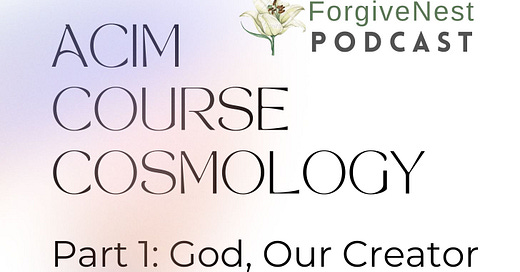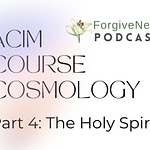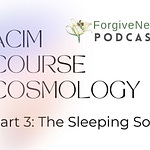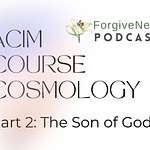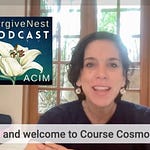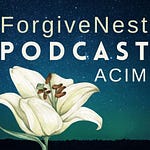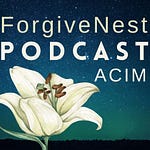Slideshow—best viewed on full screen or tablet
Transcript: ForgiveNest Podcast for A Course in Miracles, Part 1: ACIM ‘Course Cosmology’, Series, God Our Creator - A Course in Miracles View on God, with Alison Anton
Hello and welcome to Course Cosmology, Part 1: God, Our Creator. I'm Alison Anton with the ForgiveNest Podcast for A Course in Miracles. This is a four part series on the main characters, so to speak, of the Course. We have God, the Son of God, the Sleeping Son, and the Holy Spirit.
The series is designed to help eliminate confusion about these characters, what their function is, and how they relate to each other, and to us. A Course primer like this can help you make sure you're beginning on the correct footing, or in the case of old students, as a review or even a checks and balances of your understanding.
I thought we'd start off the series with a Course quote from a section in the text called The Conditions for Knowing God:
You cannot understand how much your Father loves you, for there is no parallel in your experience of the world to help you understand it. There is nothing on earth with which it can be compared, and nothing you have ever felt apart from Him that resembles it, ever so faintly. [ACIM CE T-14.VI]
I wanted to start with this passage because I think it's essential to lay down the fabric that A Course in Miracles says: God loves all of us all of the time. And as this passage suggests, with the love so powerful, there's nothing in the world that we can compare with it.
I think it's important to start out with this because of the traditional religious tone that God can be wrathful and punishing, or even sometimes loving, or sometimes loving to some of us—but not all of us—and only under certain circumstances. This is a huge big deal for us as Course practitioners because the Course's goal is to guide us back to Him. If we're carrying fear or resistance or mental image pictures of a wrathful God, that's obviously going to block us from wanting to take those steps back to Him. We may resist anything with the word God in it.
Fear of God is a central theme in the Course. Don't worry if you're resistant to God. We all are, very specifically; it's the M.O. of the ego. The fear is deep and ancient and goes well beyond religious programming. Religion, in my opinion, merely perpetuated a very ancient fear.
In any case, it helps to reinforce often that God from the ACIM perspective is always loving with no exceptions of who He loves.
It's always all.
Who God Is and Isn’t
So let's look at what God is and isn't from the Course perspective. This isn't an exhaustive list, but I've tried to include the main themes as I know them, and things that some students—including myself—have gotten confused on at one time or another. So we'll start at the top left and we'll move to the top right and then left to right and left to right as we go down the list.
God is formless. The Course refers to God as light or as love, and that doesn't have shape or form. And that, of course, means God is neither male or female. I covered this in the intro video that "gender neutral" isn't even the right term because God or anything related to spiritual presence can't be associated with gender at all.
The reason the Course uses the noun "Father" or pronoun "He" is simply because it was written in traditional English and uses traditional Christian terminology. But nowhere in the Course is God actually referred to as a male or a man. The pronouns are grammatical only. Please listen to the intro if you want more on this.
Moving down here, God is timeless and eternal. He did not create time or timelines and therefore is not dwelling in time. Time and space go together, so He's not in any kind of space either. If there's any dimension at all that He's in, it would be eternity.
Jesus says in the Course:
Eternity is one time. It's only dimension being always. [ACIM CE T-9.VI.7:5-6]
And that's the perfect segue for the next two lines:
God is the Kingdom of Heaven. Or we could say, He's the container of the Kingdom. It's not a space or a place. It's simply all that is. The Course says the Kingdom is reality.
Reality is everything. [ACIM CE T-9.I.15:3]
Therefore, He's not in the Kingdom; He is the Kingdom. In other clear words, He is the Creator of reality; what's real.
He's not the maker of the world or even the 3D universe. These are not considered reality to the Course. From the Course perspective, the world is a fabricated illusion, part of a dream, which we'll go into detail in Part 3: The Sleeping Son. To us, it seems very real. The Course does not deny that at all, but it only seems real because we're so closely tied to the dream.
So if God didn't create the world, did he create the body? One short passage says:
God did not make the body, because it is destructible and therefore not of the Kingdom. [ACIM CE T-6.VII.2:1]
So that answer is a strong "no" in the Course and is repeated often.
Like the world, the body is a dream figure. Obviously this is a huge talking point, and I'm not underestimating that it's a major subject line in the Course, but for the purpose of this series, we'll just touch on it as a bullet point.
Something to say though is that He did create His Son, who is created in God's likeness. Likeness here, being eternal, indestructible, formless, and created in love. Things that are born and that die are not made in His likeness and therefore are not of Him.
And finally, God is knowing. Knowing is often referred to in the Course as our natural state of being, in comparison to perception.
The Course says:
Being of God, knowledge has nothing to do with your perceptions at all. [ACIM CE T-3.V.7]
The five physical senses of the body are perceptual. But that also includes the so-called higher perceptions, including any of the psychic abilities. These are abilities we all have, but most of us tend to block these, so then we assume the people who aren't blocking them are “gifted”, but the true gift of God—the true attribute that's inherent in us—is knowledge because knowledge is of God. God doesn't need perception because He is fully knowing. He knows all, and He extended that knowing to us because we are of Him.
Okay. Quick recap of this slide:
God is formless and shapeless. He is not gender associated.
God is eternal and does not reside in—nor did he create—the dimensions or timelines. (The Holy Spirit does repurpose these, and we will talk about that in the last part of the series, but we'll get there.)
God is the Kingdom of Heaven, not in the Kingdom.
God is the creator of reality, which is the Kingdom of Heaven that we, His Son, are part of.
He's not the maker of the world, which includes our planet, the physical universe, and our bodies.
He has knowledge, which is everything and has no need for perception.
God Creates Through Extending Love
Let's come back to love again because I didn't include it on our previous list and that's because I talked about it at the very beginning, but love is the main driver in the Course, and I feel the need to say a few words on how the Course says God creates in love.
So our first bullet here is the reminder that God is love and He creates by extending it. Extending is often compared with projecting In the Course. We can think of extending as sharing. And in that sharing, love is extended "outward". (And we can put "outward" in quotes here because there's no space or time to go anywhere.) This extension happens within the Kingdom, expanding the Kingdom within itself.
Obviously these are concepts that go beyond space and time, but the Course picks words like "extension" and "sharing" as our natural state of being to relay things that technically can't be explained in words or symbols.
God has thoughts and volition; together we could call these God's Will. Love really is a thought or an idea of God. And He willed to add to that love by extending love or sharing it. And this is how He created us. He extended Himself in love to create His Son.
The passage at the bottom pulls this all together:
God's thoughts are given all the power that their own Creator has, for He would add to love by its extension. [ACIM CE W-WI.11.2:1]
In other words, the powerful, loving thought of God added to Himself by extending Himself.
The Kingdom of God
So I'm using the flower of life symbol as a symbol of God's Kingdom. But a caveat here is that nowhere in the Course is the symbol referred to or even mentioned. This is just one way to envision Course cosmology using a symbol. I'm not in any way suggesting this is what the flower of life is, or that this is what it's supposed to mean. I'm simply using it as our symbol right now in the context of this series to help us envision the Kingdom of God using a mental symbol.
The outer gold ring in this image symbolizes God, and everything within that gold ring is God's creation. So we're looking at God, and His Son, or Christ, which is the silver ring just inside the gold ring and the multitude of silver rings inside the sphere, as God's son is one and many. And we'll talk about that in the next video. As we mentioned from the Course perspective, God's creation is all there is in reality.
There is one miracle, and there is one reality. [ACIM CE T-13.IX.6:3]
The one miracle he's talking about here is the Son, and the one reality is the Kingdom. So really nothing truly exists outside of the Kingdom. We imagine it does, and you may know this next famous Course quote:
Ideas leave not their source. [ACIM CE T-26.VII.4:6] [ACIM CE W-132.4-5] [ACIM CE W-167.3:4-5] [ACIM CE W-156.1:3]
Remember, God's Son is God's idea, which means we don't leave Him because He is our Source. "Ideas leave not their source". And just as we are in God, God as well is in us:
The Kingdom of God is within you and can never be lost. [ACIM CE W-77.3:4]
In the flower of life symbol we can see God in each of us represented as the bright ball of gold light within each silver sphere. We are in God and God is in us.
Heaven’s Need-Lack
In Heaven, there is no need for needs. Jesus calls this the "need lack". In his way of framing it, it's a positive. Because Heaven is perfect, there are no needs. He says:
Until the separation, nothing was lacking… This meant that you had no needs at all. If you had not deprived yourself, you would never have experienced them. [ACIM CE T-1.48.20:2-5]
Meaning, if you had not deprived yourself of Heaven, you would never have experienced the need for needs. Needs would never had existed.
So let's go quickly through this list of needs that we certainly feel we need here in bodies, but that according to the Course, are not needed in Heaven.
There's no need for fear in Heaven. And that's because we are completely contained within the safety of God and God's Kingdom. Nothing is attacking us, and so we don't need to defend ourselves in any way. Likewise, we are not attacking anything and therefore pose no threat. As we've learned, there's nothing outside to attack. Love exists inside and we are completely safe and loved.
There's no need for perception. We talked about "knowingness" or knowledge. In Heaven we know all, so we don't need to perceive it through the senses of any kind. Knowledge is the same reason we don't have a need for learning in Heaven. If we already know all, there's nothing to learn. Learning is only something we do here for the purpose of getting us back to knowledge.
There's no healing in Heaven. This also makes sense because nothing needs healing. Just like learning, we use healing here for the purpose of getting us back to wholeness. Heaven is wholeness because we have never left our source. God is in us and we are in God. Healing is not needed when we're already whole.
There's no need for a body or a world. The body is a perception machine, it's not part of God. It's a projection or a dream figure, according to the Course. The very moment we again know and the very moment we remember our wholeness is the very moment when these quote unquote "learning devices" are no longer needed.
God’s Will Is Our Will
Okay, two more quick slides here. I think this is maybe the most important one in the deck. Our Will is God's.
So before we look at the powerful quotes on this slide, let me just say that all the things we don't need in Heaven, from the previous slide, we just can't imagine not needing. Here on Earth we need a body. We need a world for our body to be in; we need our defenses to protect our body; we need our perceptions, and having someone tell us we don't need these things, that our goal is not to have these things, that can feel like someone is trying to take our safety away from us. Or it can feel like Jesus or God is trying to impose their will on us; an "alien will" that isn't our own.
But the Course reading and the practices—and Jesus himself, who we believe is the author—are there to help us understand one thing: God's will is our will. Our will is the same.
So when we fear it or resist, and we have that deep sense of sacrifice, we can remind ourself that God created us in love and we do want this. Jesus says:
God wills you perfect happiness now. Is it possible that this is not also your will? [ACIM CE T-9.VI.10:5-6]
God also gave us free will. Out of love it couldn't be any other way. The very core of who we are is calling for healing. Nothing is being imposed upon us. It's our choice. And as he says in the next quote:
God's plan for your salvation could not have been established without your will and your consent. It must have been accepted by the Son of God, for what God wills for him, he must receive, for God wills not apart from him. [ACIM CE T-21.V.6:1-3]
And the last quote at the bottom:
Let me remember that my goal is God. [ACIM CE W-258:1]
This truly is what the Course is about. Our goal on this path is to receive the help we've willed for so that we remember God, we remember His Kingdom, and we recognize all of us as the Holy Sons of God, as God's Kingdom.
Closing Prayer
To conclude, I thought we'd close with this statement from Jesus to us as a proclamation of the love God has for us, the holiness of our joint will, and our safety within God's Kingdom:
Oh my brothers, if you only knew the peace that will envelop you and hold you safe and pure and lovely in the Mind of God, you could but rush to meet him where his altar is. Hallowed your name and His, for They are joined here in this holy place. Here He leans down to lift you up to Him- out of illusions into holiness; out of the world and into timelessness; out of all fear and given back to love. [ACIM CE C-3.8]
Up Next: Part 2, The Son of God
Up next is part 2 of our Course Cosmology series, where we'll talk about the Son of God. We are the brothers Jesus is talking about. We are the same as he is; the Holy Son of God.
Thanks for listening to the ForgiveNest Podcast, your place to explore ACIM topics in meditation, healing, and your special function in forgiveness.
I'm Alison Anton. It was great talking to you.

